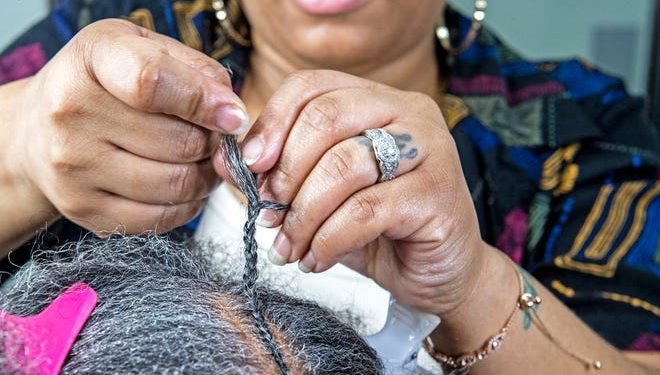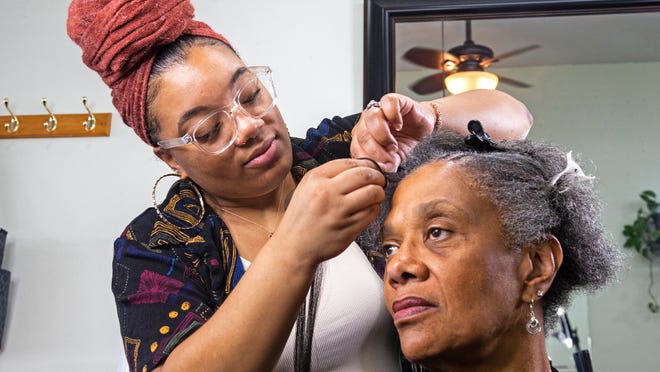She felt secure.
Music and acquainted voices hummed round her Salisbury house. Tahlia McLendon nestled between her mother’s legs on the lounge flooring, attempting to sit down nonetheless. The youngest’s tiny rows of braids would take practically two hours.
Smells of product bloomed as her cousin’s hair relaxed, and her sister labored beside her. Busy fingers labored in tight sample, whereas others let earlier work unravel. Girls round her traded tales, giving recommendation and discussing a world the 5-year-old was simply attending to know. Not but tying her personal footwear, she sat transfixed by different loops.
“There was a number of knowledge being spoken in these moments, a number of love being shared,” McLendon remembered, sudden tears discovering the perimeters of her brown eyes. “I simply preserve relating it to feeling consolation, with your loved ones, all people chatting … I’m sorry, simply memorable.”
Whether or not the expertise performed out on the lounge flooring or a kitchen desk, the mild pull of her mother’s braids or finally her personal, these weekly moments of custom throughout generations impressed a ardour.
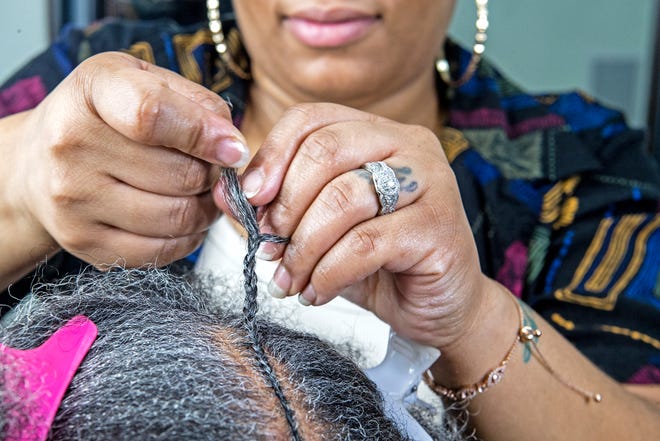
Some 25 years later, McLendon works with hair for a dwelling. Such reminiscences not solely drive her profession — now working at Thee Essenze Hair Salon and Barbershop close to New Citadel, Delaware — they may also be carried again along with her to the ultimate internet hosting of the National Folk Festival in Salisbury, Maryland.
Armed with mannequins, tripods, equipment, her personal hair oils and household palms, McLendon plans to carry an interactive show to the competition. She hopes to share strategies of a craft rooted in private identification, regional historical past and deep cultural connection.
Opinion:‘Politicized and demonized.’ I am laying down burden put on Black hair
She referred to as on the identical assist she grew up with on the Decrease Shore.
“Once I initially informed my sisters, it was simply immediate assist,” McLendon stated, recalling her choice as an artist this spring. The beautician, dealing with something from braids to flat-iron companies or pure hair care, knew she’d nonetheless need assistance from her two sisters, Raeshema and Dia Hitch.
“It was form of acquainted — I felt like we’ll be again to that place we as soon as have been.”
Shared roots
She didn’t keep nonetheless lengthy.
April Jackson remembers her daughter’s identical little head finally turning round in protest.
“Tahlia might have been like perhaps 8 or 9, and he or she simply insisted on attempting to do her personal hair,” the Salisbury metropolis councilwoman stated with fun. “She maintained her personal hair at a really early age, regardless that I attempted. And he or she did an excellent job at it, I can let you know.”
IF YOU GO:Ready for more? National Folk Festival will returning to Salisbury Aug. 26-28
Jackson braided hair lengthy earlier than she had McLendon or her three different kids. Impressed whereas briefly dwelling in Philadelphia, she remembers bringing again beads and types on the Delmarva Peninsula, training on different youngsters in Lakeside Park by the point she was 9.
Later elevating kids on her personal, Jackson took to braiding and different hair care much more. When the mom wasn’t at school or working two jobs, she’d pack appointments from Friday to Sunday, hoping to make extra cash to maintain the household snug.
She watched her youngest daughter decide up on it. Appointments have been made with the dolls in her room. She stored up along with her older sisters, who have been already dabbling in braiding and dealing with weaves.
“It simply grew,” Jackson stated. “I used to look at her do her Barbies, and I am like: ‘She’s gonna find yourself doing hair; she’s gonna find yourself doing hair.’”
Mother had a degree.
Her sisters, brother Raymond and even her father have all taken curiosity in hair — however right this moment McLendon is the one bringing care and upkeep suggestions house to go to. About 5 years out of her Paul Mitchell cosmetology education in Delaware, she’s been sharpening her expertise close to New Citadel.
It’s a path she didn’t all the time see, learning in faculty, becoming a member of the army. But, now it couldn’t really feel extra pure.
“I can’t pinpoint precisely when that hit me,” the 31-year-old stated, sitting within the automotive forward of her first consumer. “My mother and my sisters, through the years, I’ve watched them braid tons of individuals’s hair. I really feel prefer it virtually simply form of fell in my lap.”
Greater than strategies have been handed down.
Greater than braids
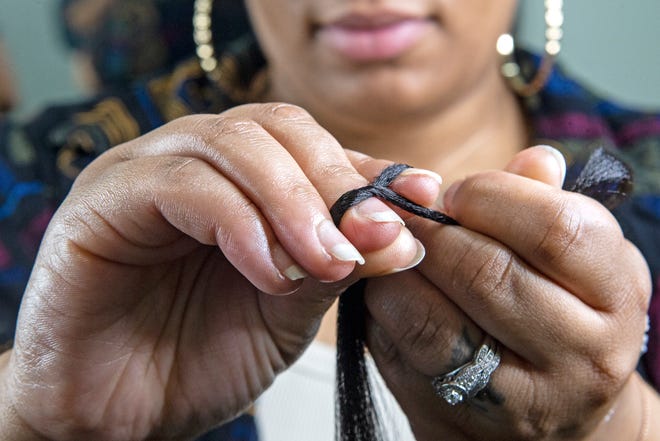
She doesn’t like being the focal point.
Standing behind the chair, working with numerous shapes and textures of hair, McLendon’s work can take hours. She will get to know her shoppers. She’s no stranger to giving recommendation, at instances close to remedy, whereas her palms are busy.
So the stylist hopes an intimate competition setup may permit her to debate greater than the newest braids.
“The African tradition of braiding — that is one thing I might need individuals to wish to find out about, if it piques your curiosity,” McLendon stated. “There are such a lot of cool issues that underlie the precise basis of braiding, so I do plan on having a little bit little bit of training as nicely.”
Braids have been as soon as a mode of communication between African societies, in response to the 81st Nationwide Folks Pageant, imparting particulars about identification, marital standing and beliefs, in what some name “the primary type of fiber or textile artwork.”
Black hair itself has lengthy been tied to identification, as Lori Tharps, author and former affiliate professor at Temple College, echoes in a e-book she co-authored, “Hair Story: Untangling the Roots of Black Hair in America.”
Her work traces types and meanings — from households having a particular coiffure, to complexities speaking your home in society — all the best way to pre-colonial west Africa. Slavery practically erased these traditions. That period and the next a long time within the U.S. sowed the seeds for racist stereotyping round Black hair, which still persist today.
Fades, fros and locs:House passes CROWN Act banning race-related hair discrimination
Generations have needed to face the restricted lens of Eurocentric magnificence requirements. By the Sixties, Black hairstyles even performed their very own function in Black liberation actions. Many say they nonetheless encounter pressure or discrimination. At the moment, momentum continues to celebrate natural hair, whereas Black hair care stays a logo of identification, freedom — or just artistic expression.
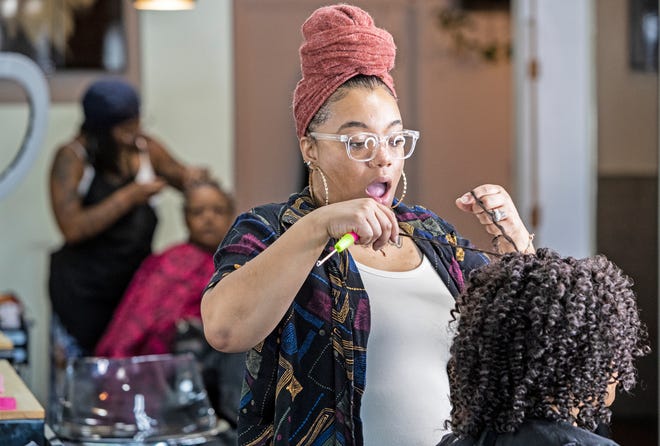
McLendon is honored to signify her little nook of Delmarva crossroads.
“I do know my roots in terms of hair braiding,” she stated. “It’s a really sentimental second to me, and I imagine issues occur for a cause. … The artwork kind that we’re doing goes again years and years. Nonetheless carrying on that custom? It is superb.”


